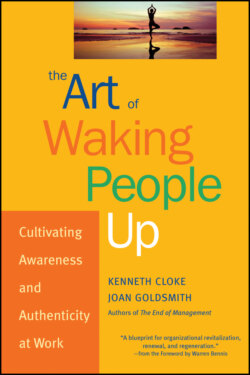Читать книгу The Art of Waking People Up - Kenneth Cloke - Страница 44
Clarifying the Goals
Оглавление
Our goal in waking ourselves and others up is not to produce conformity to some abstract, idealized managerial model of the perfect employee. Rather, it is to assist ourselves in becoming more fully, deeply, and authentically who we are, so we can bring more of ourselves to our work. It is to create relationships of trust, environments of learning, and organizational structures, systems, cultures, and processes that allow us to self-correct and achieve balance in our lives, and be able to learn from every work experience in ways that improve our capacity for perception, understanding, growth, learning, and change.
Actually, it is precisely our flaws, complexities, and diversities that make us empathetic, interesting, and adaptable. Our mistakes, glitches, and blemishes are enormous sources of creativity that can help us locate fresh solutions to seemingly intractable problems. The English novelist D. H. Lawrence attacked with a vengeance the simplistic approach to perfection that so often characterizes organizational efforts at personal improvement:
The Perfectibility of Man! Ah heaven, what a dreary theme! The perfectibility of the Ford car! The perfectibility of which man? I am many men. Which of them are you going to perfect? I am not a mechanical contrivance. Education! Which of the various me’s do you propose to educate, and which do you propose to suppress?
The ideal self! Oh, but I have a strange and fugitive self shut out and howling like a wolf or a coyote under the ideal windows. See the red eyes? This is the self which is coming into his own.
The perfectibility of man, dear God! When every man as long as he remains alive is himself a multitude of conflicting men. Which of these do you choose to perfect at the expense of every other?
The very goal of perfectibility emanates from a false assumption that who we are is inadequate. It assumes there is an abstract, ideal, rational state to which we should all conform; that it is important to suppress the parts of our selves that are not perfect; and that it is possible to do so over time without serious personal, organizational, and political consequences. Yet who among us is perfect? Isn’t perfection itself a kind of imperfection and imperfection a kind of perfection? Who is qualified to define the ideal characteristics to which we all must conform? Do not advantages flow from the very flaws we try so hard to discourage? How do we become someone we are not without losing our souls and thereby becoming imperfect? And is not imperfection sometimes simply the voice of a new paradigm pointing to improvement and new possibilities?
Rather than aim at perfection or lofty, idealized, generic standards of behavior, a different approach would be for organizations to provide employees with the unique information, instructions, and support that allow them to do better at whatever it is they want to achieve. This means assisting them—not in accepting historically mandated conditions but in actively transforming these conditions and adapting them to their own visions, styles, and values. It means championing employees who do not conform to ideals of perfection but contribute in unique ways to their colleagues and organizations. It means encouraging people to see their imperfections as sources of learning, growth, and change. It means using turnaround feedback, coaching, mentoring, and assessment to wake people up, transform their organizations, and cultivate awareness and authenticity in their work.
By turnaround we mean using reconfigured organizational processes to take big risks and support change in big ways. By transformation we mean returning to who we are and becoming who we want to be. Turnaround and transformation are achieved by empowering employees to participate fully in making organizational decisions; by encouraging them to take responsibility for the choices they make; by not blaming others for their lack of awareness and authenticity but encouraging them to develop the skills they need to do whatever they choose to do; by bringing them into collaborative, democratic relationships with each other; and by making it possible for them to dedicate themselves to work passionately for what is most important to them.
This may sound easy but is extremely difficult in practice, because it comes with a price. To get there, it is necessary to drop the mask, cut the crap, lose the pose, and become deeply honest—first with ourselves, then with others. We are required to invite disagreeable news, encourage painful feedback, and learn to pick ourselves up by the bootstraps; to take the risk of discovering and being who we actually are—not in isolation, but collaboratively with others. Freedom in this sense is not exercised against others but with and for them.
